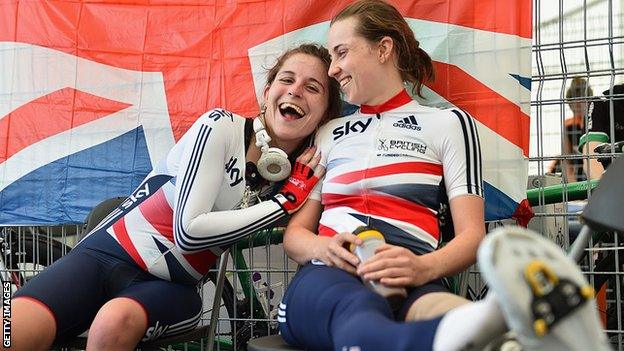International Day of People with Disabilities: Hannah Dines - Why I'm sick of 'inspiration porn'
- Published

Tuesday, 3 December has been designated the United Nations International Day of People with Disabilities.
Here, Hannah Dines, Rio 2016 Paralympian and contributor to the BBC's Para-sport podcast Stumps, Wheels and Wobblies, gives her thoughts.
It happens time and time again in Paralympic sport that the story is chosen for us.
Our disability is the negative comparison that makes our positive sporting performance legitimate. We cannot have one without the other. The irony here is that for many Paralympians, their disability is a good thing.
When disability activist Stella Young coined the phrase "inspiration porn" in 2012, it was to describe the portrayal of people with disabilities as inspirational solely, or in part, on the basis of their disability.
Like the preposition "despite", "you're so inspirational" only works with a point of contrast.
If you say someone is inspirational after seeing them perform a physical feat in place of saying "you are really good at what you do", you should know you could be insulting them.
As a handy guide for anyone: switch Will Bayley after his Strictly Come Dancing dances with Tom Daley after a winning dive, water droplets bouncing off his biceps. If you can't say "wow, that was really inspirational" to Daley, don't say it to Bayley.
Like Bayley - and Daley for that matter - I move in my own way, and while I'm nowhere near as graceful, there is still beauty to found there.
Where sport is concerned I am not a 'despite' - I am a 'because of' my disability.
Because of my disability, the National Health Service has had plenty of treatment options to get me on my feet.
Because of my disability, I have to maintain a high level of fitness.

Hannah Dines (left) with her Great Britain team-mate Elizabeth Saul at the Para-cycling Road World Championships in 2015
When you say a sportsperson is inspirational, you could be denying them licence to comment on any of the positive aspects of their disability.
The narrative is always that I won the gold medal by conquering my disability. However, by making the disability the antagonist, you remove the emphasis from attaining skill in the sport.
It suggests a Paralympian's success is mostly in the mind; that with enough determination you can do anything. As if I can think myself out of my cerebral palsy. As if those with more severe spasticity are to blame for it because they weren't headstrong enough as children.
The irony is that most Paralympians are in harmony with their bodies by the time they make it to a Games. Most dominate in their respective classifications because they have the best disability. They spend less time having mental anguish at themselves and more getting ridiculously good at their discipline.
Basically, they win their medals the same way as Dina Asher-Smith does.
The public don't see many of our events, but they especially don't see our hard work.
We assume muscle mass is down to time spent in the gym, and leaner bodies down to hours spent enduring exercise.
Anyone who moves differently - whose strength or fitness presents in a different way - won't get status.
It means grace, skill and muscle mass are still owned by typical brains and typical muscles. Sporting achievement is theirs too.
I wonder if what we do as Paralympians is make able-bodied people feel better about a thing they perceive to be uncomfortable, that's nothing at all to do with sports performance.
Of course the news story of the Belgian Paralympian Marieke Vervoort ending her life through euthanasia got more coverage than my own World Championships. Of course the nearest Paralympian with a vaguely similar disorder got asked to stand by their decision to stay alive.
I do believe in the right to choose - but especially in the right to choose how my physicality is portrayed.
So for Tokyo 2020, and for this this year's United Nations International Day of People with Disabilities, I'm taking inspiration back.